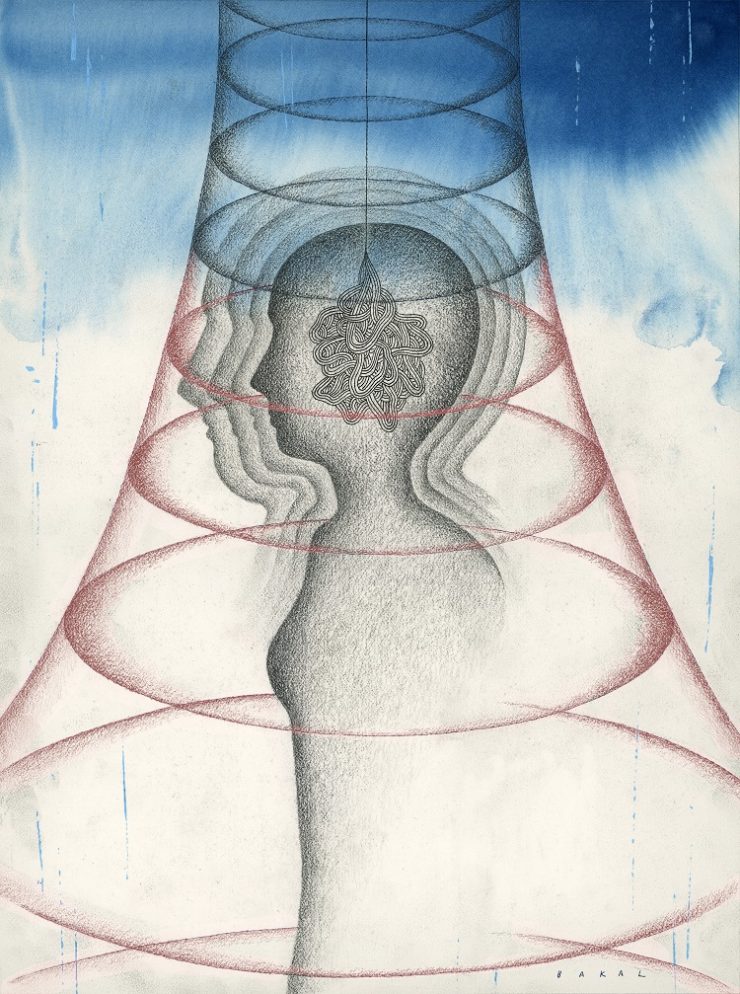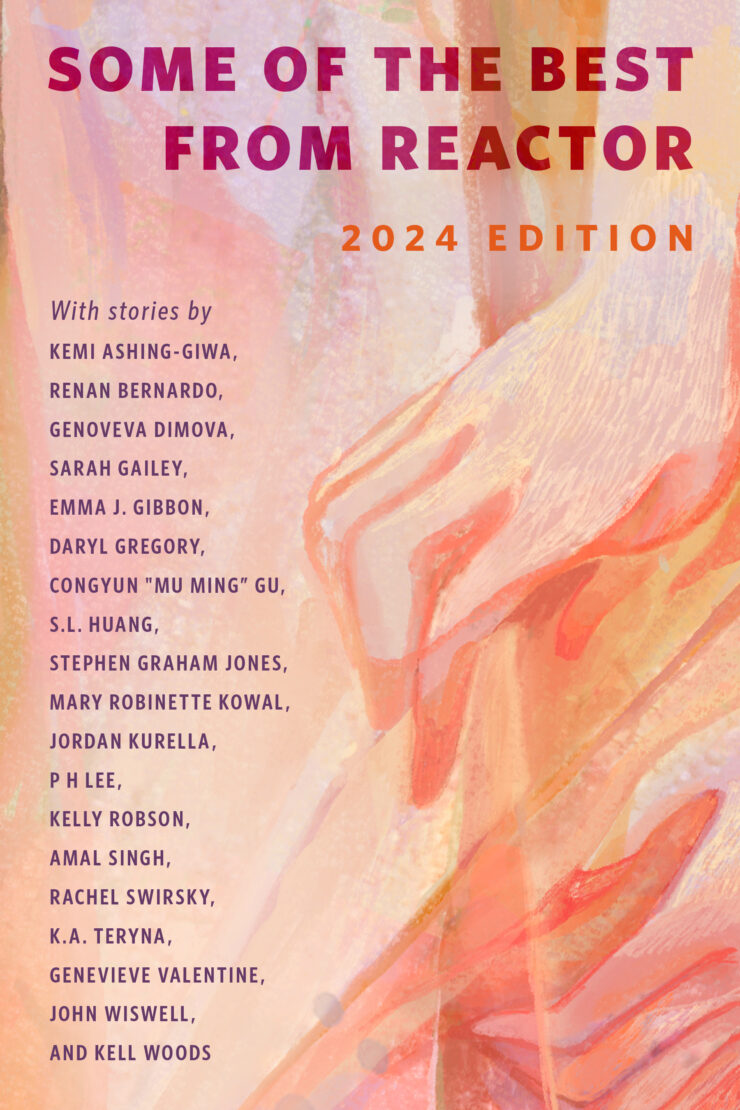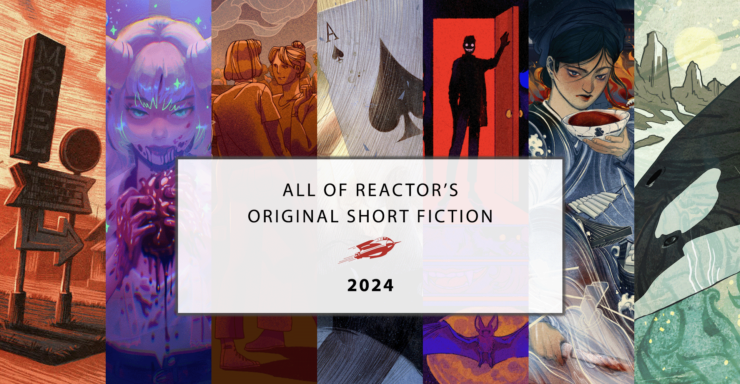When young Ira arrives for her appointment, she is prepared to be transported to The Gateway to Heaven, 6,070 light years away. But the technicians shepherding her through the process fear there’s more to it than what’s advertised.
“The Far Side of the Universe” was translated from Chinese by Michelle Deeter.
A young person entered, looking vulnerable. Her peer supported her by the arm, walking with her one step at a time, face grave. They were both wearing gray robes, indicating that they had just reached adulthood recently, and had not taken their Vocation Oath yet.
After checking the identity of the young person, ♦&x asked her to sit and proceeded to explain a long list of items. I thought it was unnecessary—the people that came here knew what they were getting into, so there was no need to explain quantum transmission or the Einstein-Rosen bridge again.
But I never stopped ♦&x. Not only were we legally required to read the fine print, it was something we needed to feel better about the process.
“That’s everything. Are you sure you want to proceed?” ♦&x asked.
“Yes,” the young traveler said.
Her peer squeezed her shoulder. But the traveler placed her own hand on top of her peer’s hand reassuringly. “I’m fine,” she said in a soft voice.
♦&x carefully took the Identity Seal and said, “This way.”
♦&x and I helped her enter the hibernation chamber, which had been activated before she arrived. Specially designed padding, comprised of gel beads, was supposed to ease any tension in her muscles. When we rested her head against the gel pillow, an involuntary sigh escaped her.
I checked the time and kept my voice light. “We will return in half an hour. Let us know if you need anything.”
♦&x and I shook hands with her peer before leaving the room.
♦&x cupped her hands around a mug, sitting on the sofa. She was unusually quiet today.
“What’s wrong?” I asked.
♦&x sighed. “I’m just thinking about how young she is.”
“Very young,” I said.
“She hasn’t even taken her oath yet.”
“I think she’s the youngest one we’ve ever had,” I agreed.
♦&x turned and looked straight at me for a long time.
“Doesn’t it make you sad?” she asked.
“Of course it does! Although—”
♦&x lifted an eyebrow.
“Although,” I continued, “being sad is only looking at it from our perspective. Everyone goes at some point. Perhaps from the other side, it does not matter how many years we have here.”
“That’s just a guess,” I added, after a pause.
♦&x looked down at her mug, not saying a word.
“Oh, I see,” she said.
When we returned to the room, both the traveler and her peer had red eyes, but they were ready for what came next. The traveler was reclined in the hibernation chamber.
“You can start,” she said.
I unlocked the control panel for her and she pressed the start button, which was located near her hand. “Don’t be sad, I’ll wait for you there,” she said to her peer.
The chamber hatch closed. The walls were transparent. We watched as sixteen nozzles emitted first a cloud of anesthetic and then a swarm of targeted nanomachines. What started as a mist gradually became a thick cloud, denser and denser until it condensed into a liquid, enveloping her. The monitors showed her heartrate spiking, then flattening, indicating that she was entering the sleep state. After a few minutes, the nanomachines would enter the bloodstream and penetrate the blood-brain barrier.
“Ira…” her peer sobbed.
♦&x moved forward and held the peer’s hand, giving me a signal with her eyes. I entered a command in the keypad. After a brief, almost imperceptible vibration, the light-shielding layer of the ceiling divided into three parts, rotated, and finally vanished. We had a perfect view of the summer sky at night. The Summer Triangle, formed by Deneb, Vega, and Altair, hung in the northern celestial hemisphere. It was bright, magnificent, and unmistakable even for a layperson.
“Is that where she’s going?” the peer murmured.
“Yes, but you cannot see it with the naked eye. It is just below the geometric center of Cygnus,” I said. I brought up a screen as I spoke, letting her see a computer-rendered simulation.
Cygnus X-1, or Cyg X-1. Photos of the celestial phenomenon appeared in textbooks from kindergarten to university. People would look at it when they couldn’t sleep at night. It was the first black hole to be discovered in human history and closest to the solar system. Now, it was dubbed the Gateway to Heaven. The dusty wind coming off of HDE 226868, the blue companion star of Cyg X-1, continued to caress the black hole. It had provided layer after swirling layer of dust and had formed a massive pale blue accretion disk.
The hibernation chamber buzzed. The chamber was now filled with the milky white liquid.
“Her heartbeat is slowing,” the peer said, her voice trembling.
“Yes. The liquid nitrogen is lowering her temperature. We need to get it as low as possible so that we can accurately record her consciousness matrix,” I said.
On the monitor, the heartbeats slowed until it was harder and harder to predict her next heartbeat, until the beats stopped altogether. A straight line extended out indefinitely on the screen.
“If you like, you can pray,” I said.
“Does it work?”
“It can’t hurt.”
“It might work,” ♦&x said suddenly. “Consciousness is a mysterious thing, after all.”
“Oh. Well, I guess I’ll try then.”
The peer arranged her hands in prayer.
A sound, somewhere between a vibration and a note, crept into the room. At the same time, the chamber began emitting a fluorescent light.
“The transmission has started,” I told the peer. “Her consciousness matrix will now—”
“—will now appear in the space station’s ultra-distance light trap in real time,” ♦&x finished.
I gave her a look. She had interrupted me. Normally I said that part.
“Within a microsecond, the qubits will be converted into photons and transmitted in the direction of Cygnus X-1,” she continued, confidently. “At this point she should already be in space, traveling at the speed of light.”
All of us were compelled to look at the stars. Above our heads, the Summer Triangle was grand. It was easy to guess what they were thinking. Their thoughts started at the solar system, then went further and further, across 6,070 light-years of noiseless space, past clouds of blue cosmic dust, then through a 44-kilometer-long event horizon, and finally arrived at the center of a black hole that was incomprehensible and never visited by ordinary mortals. Perhaps everything would converge there, perhaps the girl’s soul would be reborn. Perhaps an unfamiliar universe would appear at the end of the Einstein-Rosen bridge.
The peer exhaled. “Thank you. I should go,” she said.
“Would you like us to save her ashes?” I asked.
“No, thank you. She isn’t here anymore, is she?” She bowed courteously before pulling up the hood to her gray robe and leaving.
I watched her go and then turned towards ♦&x.
“Are you OK?” I asked.
♦&x turned her head. “I’m fine,” she said. She walked to the storage cabinets and found a decomposition bag, stopped, and let the bag fall to the ground. I approached her and noticed tears rolling down her face.
“I…saw your notes,” she said.
“Notes?”
“You cast them on the wall. You haven’t erased them yet.”
I knew what she meant.
I walked to ♦&x’s side and took her hand. We went to the bench near the wall.
“They were just some calculations,” I explained.
“But…what if you’re right? That would mean the whole process isn’t sacred at all, it’s just their…means to an end,” ♦&x said.
I did not say anything for a long time.
“Who knows. But even if it’s not sacred, what happened won’t be in vain. At least the travelers are being offered an opportunity, even though we don’t know exactly what it is. Don’t you think?” I finally said.
♦&x gazed at her knees, frowning.
“You’re right. It doesn’t matter if the process is sacred or not. As long as…as long as they arrive, that’s enough.”
I felt spots of heat on my arms—tears. I did not resist the urge to embrace her. You’re right, you’re right…I thought. As long as they can make it there, everything will be fine. But ♦&x, my dear peer, there are some things that I haven’t told you.
According to the calculations she saw, the Gateway to Heaven had eased the financial burden of the Federation. People flocked to buy the service, ending their reliance on the Federation’s life-extending medical facilities. But in reality, compared to the cost of reversing the Great Decline, which had continued for decades already, it was no more than a drop in the bucket.
Unless the real cost of the service we provided was much, much cheaper than we imagined.
My dear ♦&x, you only saw part of my calculations. Before I made the ones you saw, I had found something else in the numbers, a link between the recovery of the Federation economy and the widespread popularization of the Gateway to Heaven scheme. It was undeniable.
I calculated the cost of photon transmitters, general computation, and ultra-distance light traps. I even estimated the cost of quantum transmission and the targeted nanomachines, everything involved in what we did. It all adds up, ♦&x. To the total budget deficit that the Finance Ministry had eliminated.
Does it prove anything? Probably not. It’s all part of my wild guessing. I don’t have any hard evidence. I’m just a low-level technician—I don’t have access to critical information.
♦&x, my dear, I used to wonder why I was able to make these calculations and derivations so calmly, until the day that I realized it was because I did not care. I did not care if I went to heaven or hell when I died. I did not care if I would be reborn or obliterated. None of it mattered to me.
But I know that you care, ♦&x. Not only do you care about what happens when you die, but you care about the fate of others. You are a gentle creature, and I will never come close to your kindness.
Your body is warm, the tips of your hair soft as it brushes against my fingers. If I don’t care about our transient existence, why does sadness swell in my heart?
“What are you thinking?” you ask.
“I’m thinking…6,070 light-years is very far away,” I say.
You sigh. “Too far away.”
We look up at the night sky again. You stand.
“Come on, we should get back to work.”
“Uh huh.”
I pick up the decomposition bag and walk with you to the hibernation chamber, to the young body we’d left there.
“The Far Side of the Universe” copyright © 2021 by noc
Art copyright © 2021 by Scott Bakal














